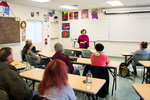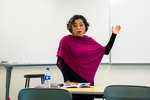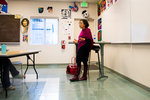


When Claudia Castro Luna arrived in East Lewis County this week, she was struck by the sight of wisps of clouds emerging from between the mountainsides.
“This is like magic, to be watching these clouds gathering like that all day long,” she said. “It’s like the clouds of the world are being born here.”
As Washington’s poet laureate, Castro Luna’s job is to find meaning in places throughout the state and put it into words. It’s a task she’s been doing since long before she earned the title in February.
In 1981, Castro Luna — then 14 — fled El Salvador with her family during the country’s civil war and came to the United States.
“The places we live stay with you and inside of you,” she said. “As an immigrant … I’m striving to put cohesion to all these places I carry within myself.”
Much of Castro Luna’s work has been tied to that idea of place. As Seattle’s Civic Poet, she created the Seattle Poetic Grid, an interactive map that highlights poems about various places within the city. She’s working on a similar map for statewide transportation routes.
Castro Luna is the first Washington poet laureate whose first language is not English, and she’s the first immigrant and woman of color to have the title. The poet laureate is selected by the governor and serves a 2-year term, a role sponsored by Humanities Washington and the Washington State Arts Commission. The position is not just an honorary award — it’s an intensive job, requiring Castro Luna to travel throughout the state, holding readings, workshops and lectures.
That work is what brought her to East County this week, where she spent Tuesday at Mossyrock High School and Wednesday speaking at Centralia College East. Thursday, she visited Eatonville High School, wrapping up Friday with a presentation at Mineral School. Mineral School, an artist residency program in a former schoolhouse, has also been Castro Luna’s host for the week.
“Most of the people who have been poet laureates understand that there are audiences for art in small communities,” said Jane Hodges, the founder of Mineral School. “I’ve heard her read a few times, and she’s really great. … She’s got an amazing story.”
For Castro Luna, the East County visit was one she’d been awaiting for some time, as she watched fellow artist friends spend time at the Mineral School and its picturesque location.
“I’ve been watching my writerly friends come and go from Mineral School and just longing to have a turn at it,” she said. “I love the idea of reusing a place like a school for something like writing and art.”
On Wednesday, attendees filled a lecture hall at Centralia College East to hear Castro Luna share her story. She shared a pair of poems by children before talking about her own childhood in war-torn El Salvador, offering some of her own writing about how the conflict “floated into my awareness” as a young person.
She followed that with a poem about bees, which she wrote after an emotional return visit to El Salvador with her father.
“Writing did what it always does, which is take me down a path I didn’t know I was going to go,” she said, noting that her chosen form of writing was well-suited for such unforeseen journeys. “Poems are able to absorb everything you throw at them. … I’ve never been rejected inside of a poem. A poem is like a country, and it has always welcomed me.”
Such a welcome hasn’t always been so evident within the United States recently, where heated rhetoric about refugees and immigrants has proven among the most polarizing of political topics. Castro Luna said she’s hopeful her work can bring some light to misunderstood communities.
“Part of my reason for doing it was to inspire immigrant kids, to show them you can become a writer, and not just a writer, a poet,” she said. “I also saw this as a chance of dismantling misconceptions or short conceptions of what immigrants are able to do. I had to learn English in order to be writing poems and doing this work. It is obviously possible to do it.”
During the Wednesday lecture, Castro Luna asked attendees about their own writing ambitions, offering encouragement and advice. Most importantly, she said — keep writing.
“The more you do it, the easier it is,” she said. “The more you write, the more you’re open to the world. The world opens up to you, and so you’re constantly thinking about writing.”
She encouraged locals to write about the places they know, the places that matter to them. She, too, will continue writing about places, as she continues a busy travel schedule across the Northwest.
“One of the things I’m very interested in as a writer and as a person is the importance of place,” she said. “By that I mean the places we live in, and how the places we live in shape who we are and who we become.”